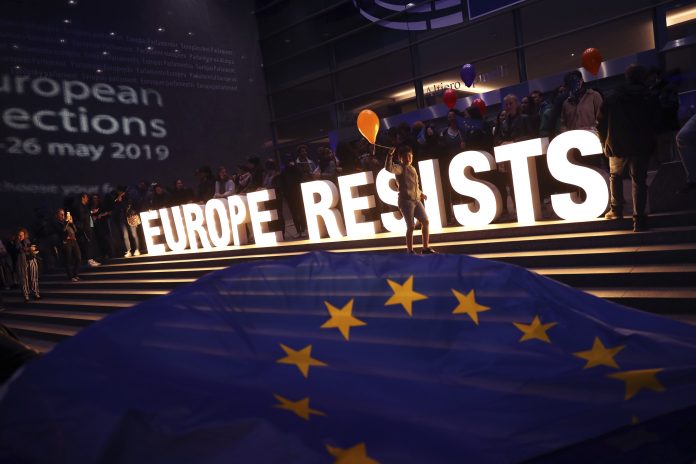
As voters in all 28 European Union countries elect a new shared parliament, here are some key races to watch in the battle to fill the 751 seats in the European Parliament:
ITALY
Italy’s anti-migrant, anti-Islam interior minister, Matteo Salvini, has been campaigning hard to boost his right-wing League party to become the No. 1 party in Italy and possibly Europe.
Salvini has been using his hard-line credentials to expand a parliamentary group of European populists that already includes far-right politicians in France, Germany and Austria. Salvini is promising to restore sovereignty over key issues like immigration to national capitals, thwarting the EU’s drive toward closer integration of its members.
In Europe, the populists will find it difficult to deliver on their transformation promises. But Salvini is also looking to capitalize on the outcome of the European elections to boost his power at home in the League’s uneasy populist ruling coalition with the left-wing 5-Star Movement.
Salvini could use European electoral gains to leverage his position in the government and pass policies important to his base of northern Italian entrepreneurs, like a flat tax or the high-speed train connecting Lyon, France, with Turin.
FRANCE
Anti-immigration, far-right flagbearer Marine Le Pen looks set for victory over pro-EU centrist President Emmanuel Macron in their epic battle over Europe’s direction.
That’s bad news not just for Macron — but also for the French leader’s grand ambitions for a more united Europe.
It’s sweet revenge for Le Pen, runner-up to Macron in France’s 2017 presidential race. And it’s a boost for her efforts to spread her anti-EU message beyond France’s borders. For Le Pen, the race was a battle to preserve European civilization from the threat of “massive immigration” and uncontrolled globalization.
Macron wants EU countries to share budgets and soldiers and work even more closely together to keep Europe globally relevant and prevent conflict. For Macron, Le Pen represents the “leprosy” of nationalism that is eating the EU from within.
Polling agency projections Sunday night showed Le Pen’s National Rally party in the lead in France’s voting, with Macron’s governing Republic on the Move party in second place.
France’s Greens party was projected to come in a surprisingly strong third place — easily beating the traditional conservative party the Republicans, far-left Defiant France and once-dominant Socialist Party.
As far-right parties courted the youth vote, Le Pen turned to 23-year-old Jordan Bardella to lead her National Rally party to victory. He called the result a “clear punishment” both for Macron and the EU itself.
GERMANY
Germany’s governing parties are headed for their worst post-World War II results in a nationwide election, with the environmentalist Greens emerging as the big winner.
Chancellor Angela Merkel’s center-right Union bloc was easily the biggest party, exit polls indicated, but with support of less than 30%. The picture looks disastrous for their center-left partners in an often-fractious “grand coalition,” the Social Democrats, who are set to score well under 20%.
It remains to be seen what effect those results will have on the governing coalition, which took office in March last year after months of wrangling and has since been marred by infighting; and on the future of their leaders.
The Greens appeared set to confirm a surge in support in recent polls amid concern over climate change, finishing second. The far-right Alternative for Germany, though, was set for an indifferent performance.
HUNGARY
Hungarian Prime Minister Viktor Orban describes the European Parliament vote as “decisive” for Hungary and Europe, an opportunity for populist and anti-migration forces to have a larger say in setting the agenda in Brussels.
While his party’s victory in Hungary is unquestioned, where the allegiances of Orban and his right-wing Fidesz party will lie after the election on the European scene is far less certain.
Fidesz’s membership in the center-right European People’s Party, currently the largest group in the EU legislature, was suspended in March because of concerns about the state of Hungary’s democracy. So Orban has spent the past few weeks hosting far-right, nationalist and populist politicians at his new office in Buda Castle.
Orban says he wants to stay in the center-right bloc while getting the EPP to cooperate more closely with nationalist and populist parties like Salvini’s League. That notion has been emphatically rejected by leading politicians from the EPP, including German Chancellor Angela Merkel.
BRITAIN
Britain wasn’t supposed to take part in the European Parliament elections at all, but had to organize a last-minute campaign when its planned March exit from the EU was postponed.
The British voting Thursday came amid intense political turmoil sparked by its 2016 referendum to quit the EU. Embattled Prime Minister Theresa May will now step down as Conservative Party leader on June 7 after failing to deliver Brexit.
Both Britain’s Conservatives and the Labour Party are predicted to be heading for an electoral pasting in the European vote due to the chaos over Brexit.
Britain’s Brexit party, led by Nigel Farage, has appeared to gain strength in recent voter surveys.
AUSTRIA
A projection for Austrian public television and the country’s national news agency points to a big win for Chancellor Sebastian Kurz’s center-right party in the European Parliament election, with the far-right Freedom Party finishing far behind in third place. That would be a big boost for Kurz before a national election expected in September.
Heinz-Christian Strache quit last weekend as vice chancellor and Freedom Party leader after a leaked video showed him appearing to offer favors to a purported Russian investor during a boozy meeting on the Spanish island of Ibiza two years ago. Kurz then called for a new election and is now running an interim government with experts replacing the Freedom Party’s ministers.q















